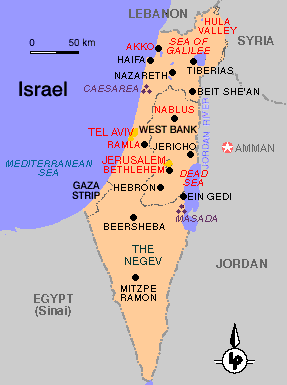
Practical Information
Below is some information to facilitate planning your trip. This information may give you an idea of what to expect when you are in the Holy Land.
Religious Holidays
When planning your trip to the Holy Land, you should always take into consideration the religious holidays of the region and its people. Since the Holy Land represents Christianity, Judaism, and Islam (in addition to Druze, Bahai, & Samaritans,) there are many holidays that affect your trip. Christmas, Easter and Jewish Holidays affect the cost of a tour and the flexibility of visits to certain churches and sites. For a calendar of religious holidays, please click on the following link:http://www.interfaithcalendar.org
The Jewish Sabbath (Saturday) is the official weekend in
Climate

For the latest weather update:
http://www.bbc.co.uk/weather/worldweather/
What to Pack
 A small day pack is indispensable for making short trips and day tours. The Holy Land is chilly in the winter, and even summer evenings in many areas are cool enough to need a sweater. A sleeping bag is only necessary if you are going to sleep outside. Hostels usually provide sheets and blankets.
A small day pack is indispensable for making short trips and day tours. The Holy Land is chilly in the winter, and even summer evenings in many areas are cool enough to need a sweater. A sleeping bag is only necessary if you are going to sleep outside. Hostels usually provide sheets and blankets.
Also necessary:
A sun hat, sunscreen, sunglasses, water, water canteen and comfortable walking shoes.
Bathing suit - also in winter for bathing in Eilat and the
In summer - clothes suitable for the hot climate.
In winter - a raincoat and warm clothing in hilly areas.
When visiting religious sites, take care to be modestly dressed.
Currency
The currency of
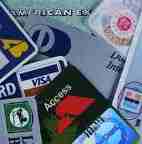 Major credit cards (American Express, Diner’s Club, Visa and Mastercard/Access/Eurocard) are widely accepted throughout
Major credit cards (American Express, Diner’s Club, Visa and Mastercard/Access/Eurocard) are widely accepted throughout
Money Exchange - Do not exchange your money in a bank! The commission charged is astronomical! The solution is to go to "Change" shops scattered around most city centers. They take no commission and equal the bank rates.
Value Added Tax (V.A.T) - Value Added Tax (17%) is levied on all goods and services and is included in the quoted price. Tourists are exempt from V.A.T on the following services: accommodation (hotels, youth hostels, field schools and camping); organized tours; tourist car hire with driver-guide; car rental; flights and tours operated by domestic aviation companies; meals provided by tour operators during organized tours; meals eaten in hotel restaurants by guests (and included in the hotel bill, paid for in any currency, including NIS.)
V.A.T Refunds - Goods may be purchased in all currencies including the New Israeli Sheqel. Tourists who purchase goods exceeding $100 (including V.A.T) in value at shops listed by the Ministry of Tourism and shops participating in the V.A.T refund program are entitled to a V.A.T refund at the port of departure. Shops offering this service display this sign: 
This provision does not apply to tobacco products, electrical appliances, cameras, film or other photographic supplies. Please be sure to obtain a special invoice for the purpose of V.A.T refund at the time of purchase. This invoice and the goods purchased should be placed in a bag which is then sealed. The bag may not be opened until after departure. On arrival at
Electrical Appliances
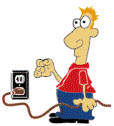
The electric current in this region of the world is 220 volts AC, single phase, 50 Hertz. Most local sockets are of the three-pronged variety but many can accept some European two-pronged plugs as well. Electric shavers, traveling irons and other small appliances may require adapters and/or transformers which can be easily purchased.
Telephones
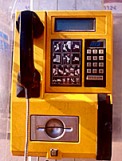 Public Telephones are operated with a plastic credit card size phone card, available at post offices and your hotel newsstand. Cards of 20, 50 and100 units are available . A reasonable way to communicate. You may access AT&T, MCI and Sprint for overseas calls from pay phones by dialing a 177 (toll-free)number - check for your service's number before you leave. Overseas operator and overseas directory information is available by dialing188. Domestic directory information is available by dialing144 (free from public phone). For collect calls within
Public Telephones are operated with a plastic credit card size phone card, available at post offices and your hotel newsstand. Cards of 20, 50 and100 units are available . A reasonable way to communicate. You may access AT&T, MCI and Sprint for overseas calls from pay phones by dialing a 177 (toll-free)number - check for your service's number before you leave. Overseas operator and overseas directory information is available by dialing188. Domestic directory information is available by dialing144 (free from public phone). For collect calls within
The international dialing prefix for
Cellular Telephones: Very popular and reasonable. You can rent them at
It is illegal to drive while holding a cell phone.
Weights and Measures
The metric system is used exclusively. A kilometer is a bit over 1/2 mile (.62 miles). A kilogram equals 2.2 pounds.
Passports and Visas
Every visitor to 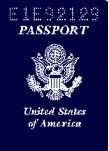
Visitors' Visas: Citizens of the following countries will be issued visitors’ visas (or transit visas - see below) free of charge at port of entry in
Europe: Austria, Belgium, Cyprus, Denmark, Finland, Germany (Persons born after 1.1.28), Gibraltar,Great Britain, Greece, Hungary, Iceland, Ireland, Italy, Liechtenstein, Luxembourg, Malta, Monaco, Netherlands, Norway, Portugal, San Marino, Slovenia, Spain, Sweden, Switzerland.
Asia & Oceania:
Africa:
The Americas: Argentina, Barbados, Bolivia, Brazil, Canada, Chile, Colombia, Costa Rica, El Salvador, Ecuador, Guatemala, Haiti, Jamaica, Mexico, Panama, Paraguay, St. Kitts, & Nevis, Surinam, Trinidad, & Tobago, The Bahamas, The Dominican Republic, Uruguay, U.S.A.
Transit Visas: Visitors interested in stopping over in Israel en route to other destinations may request five-day transit visas that may be extended for a further ten days on arrival in Israel.
Cruise ship passengers visiting
Entering
Health Regulations
There are no vaccination requirements for visitors entering
Pets: Dogs or cats accompanying visitors must be over four months old, inoculated against rabies and bear a valid official veterinary health certificate from the
country of origin.
Vaccinations: Not required for tourists entering the country.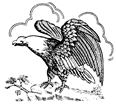
Albina Tours Ltd. - Above All Else Reliability